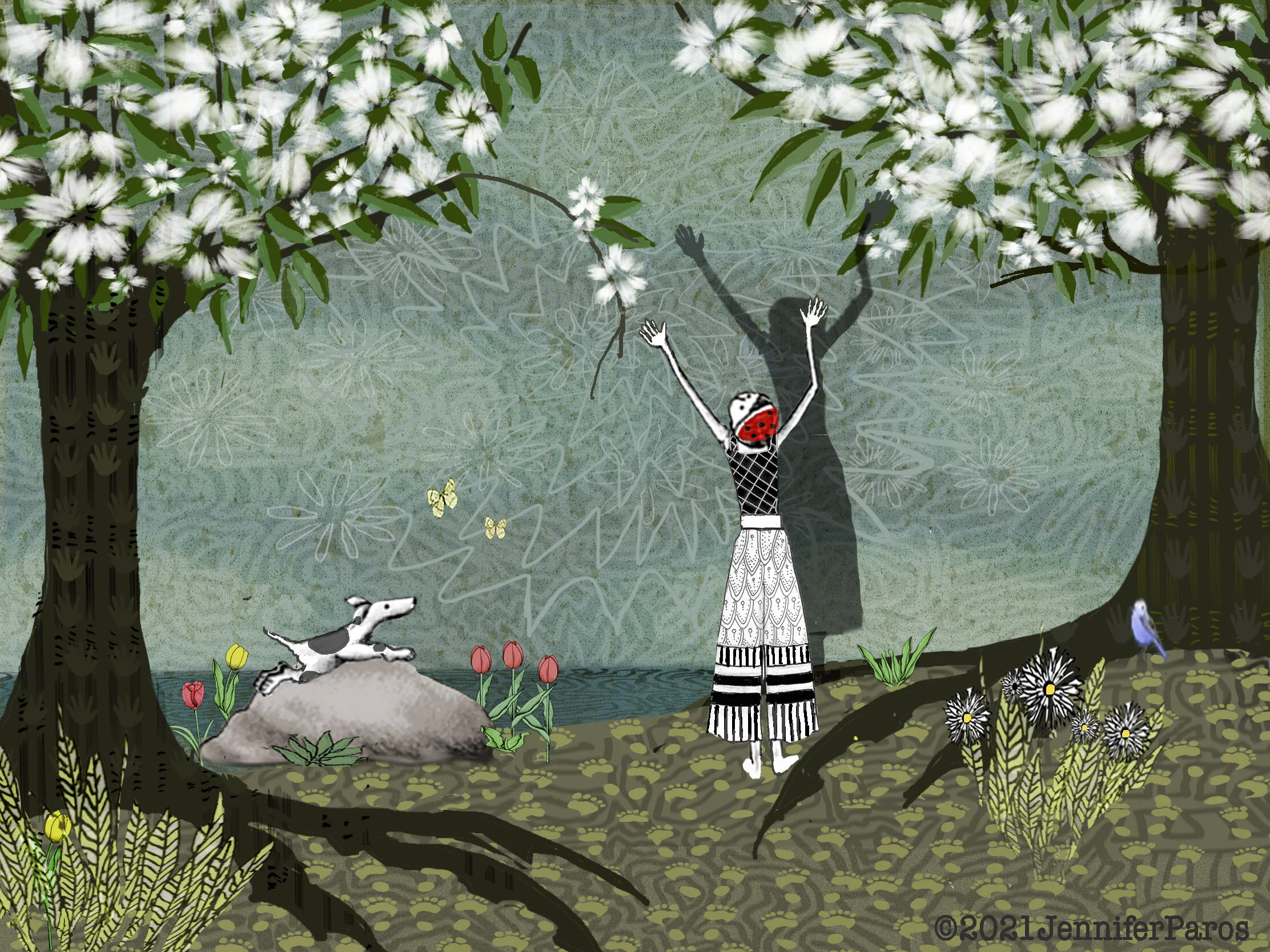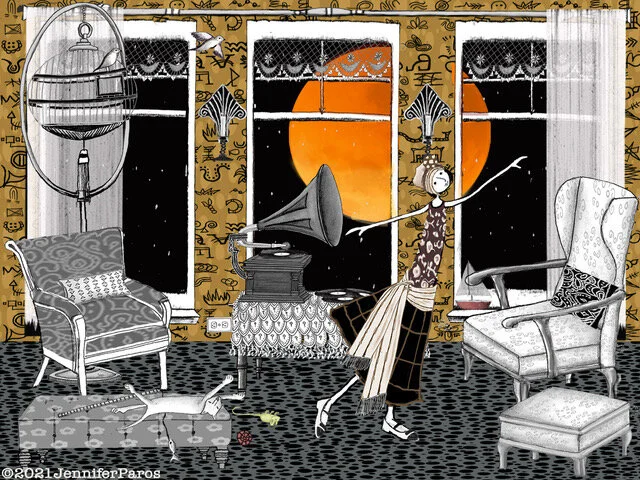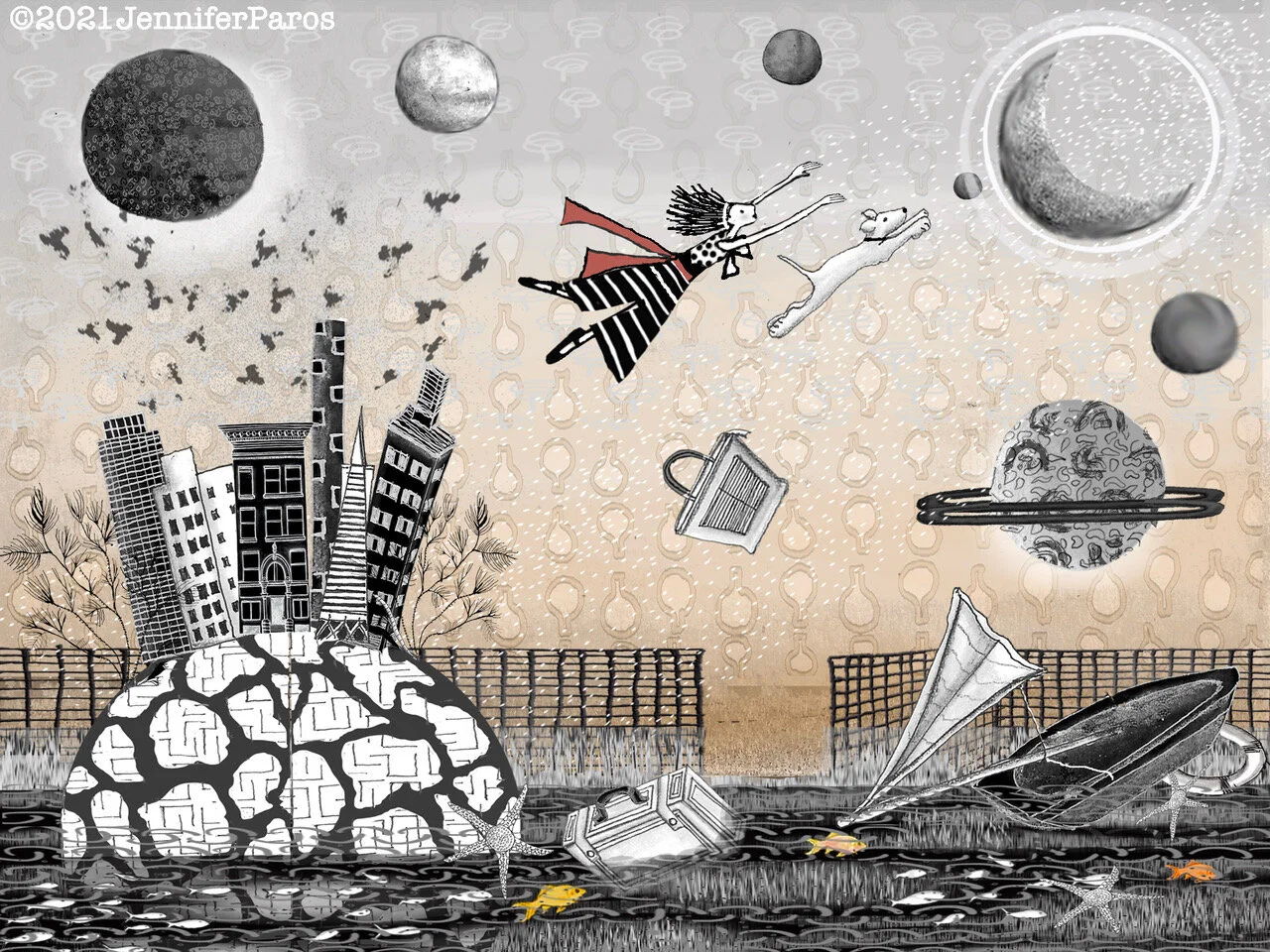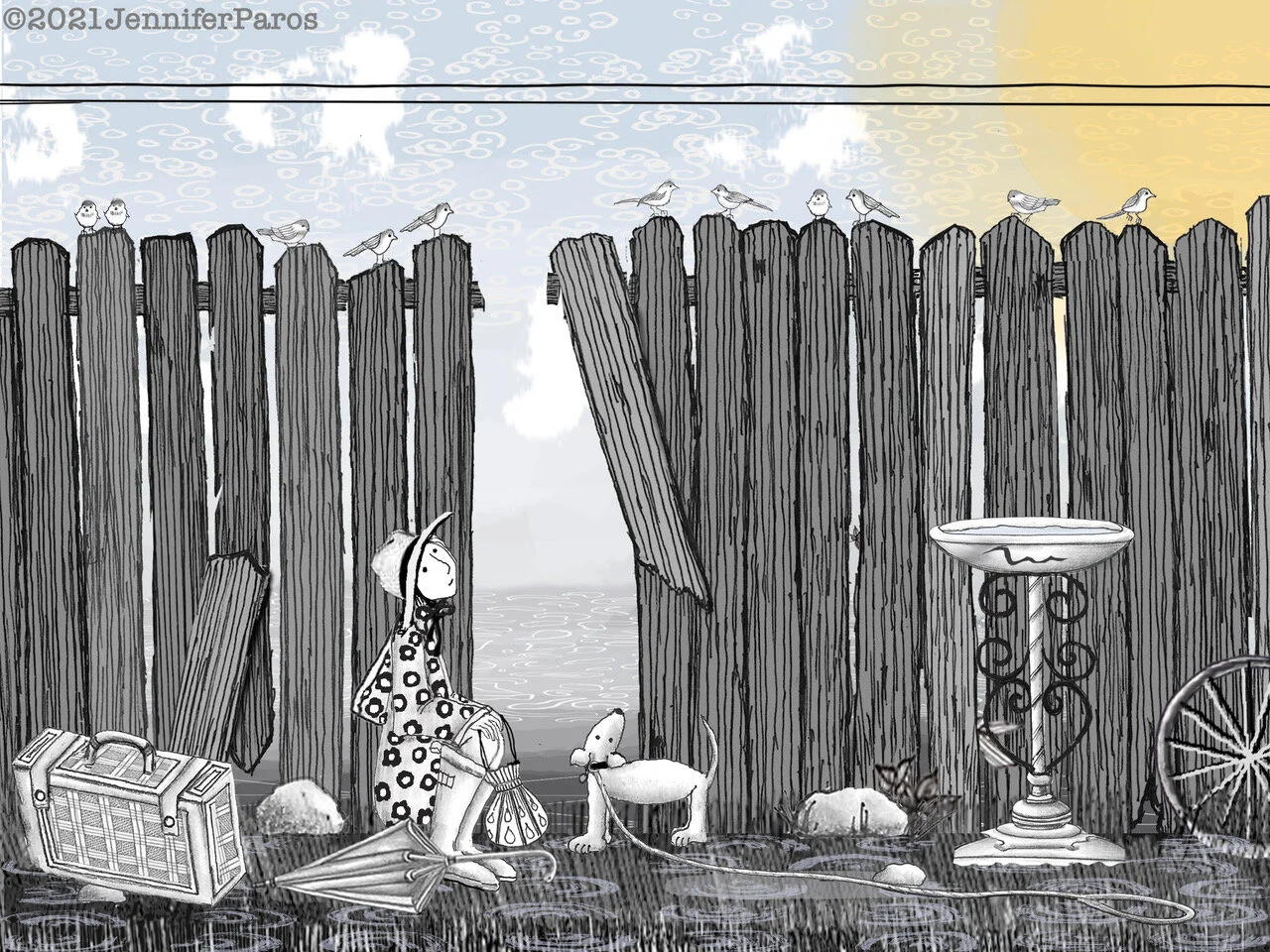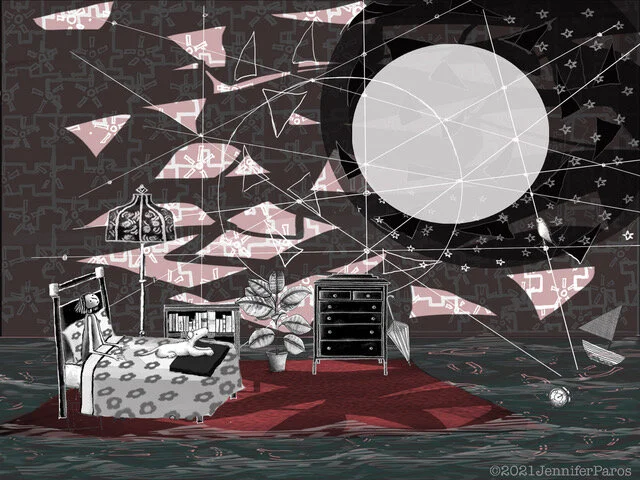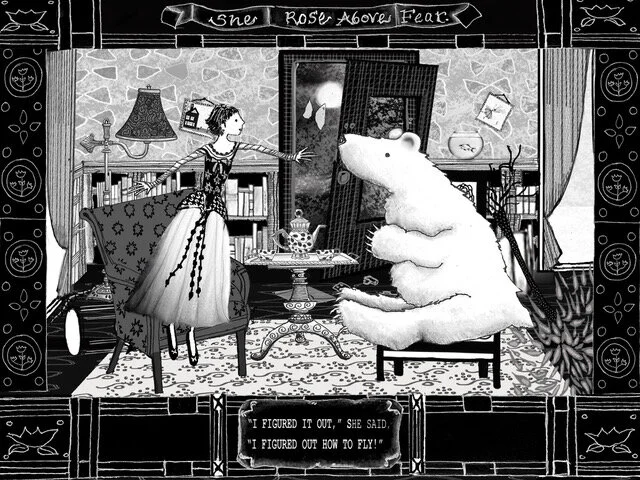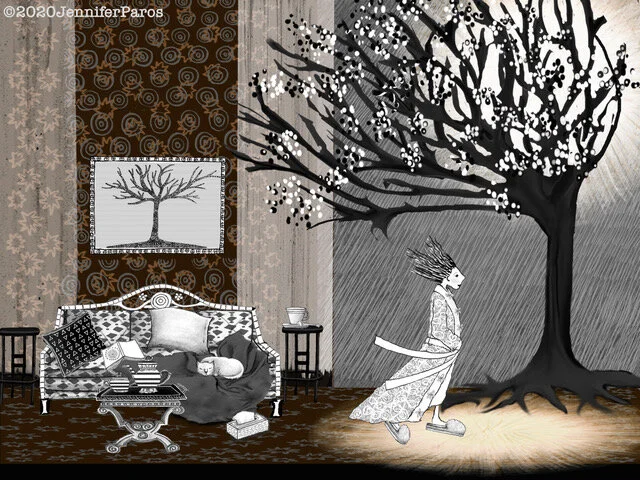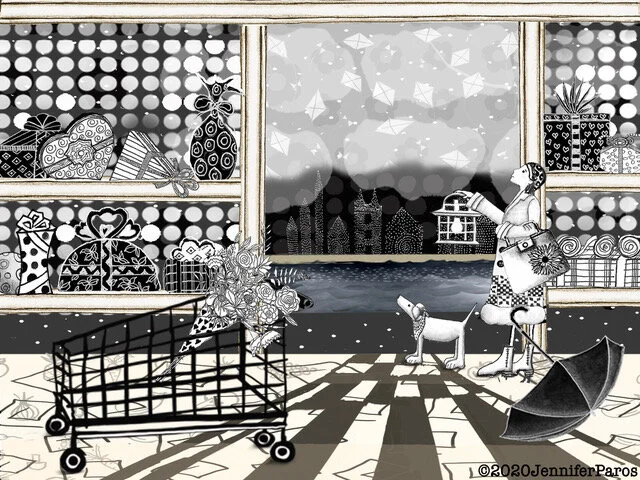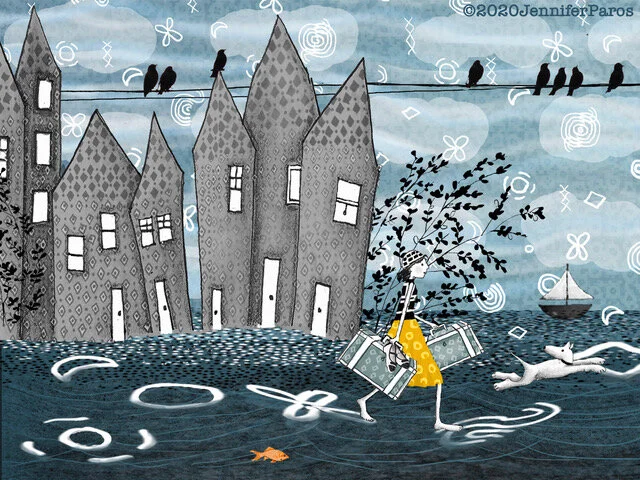I did not set out to write any kind of pandemic novel. In fact, when I finished writing Wesley Yorstead Goes Outside in 2012, it was an MFA thesis project I hoped to publish. I eagerly began querying agents, and after 110 query letters, an agent said yes. I was thrilled. I did a major revision based on my agent’s excellent feedback, and we were ready to start submitting to publishers. I thought the hard part was over. Then, the real pitching began.
Read MoreWhen I took a course in meditation, I was given a mantra and told to mentally repeat it – and whenever my mind wandered, gently return to the mantra. There would be a time when the mantra would naturally fade but when new thoughts came, I was to bring my attention back to it once more. I wasn’t to blame myself or strive to annihilate or control my thoughts; I wasn’t to believe I had failed; I was simply to begin again.
Beyond a meditation practice, calling our focus back to what we want can feel hard, but the intention to do so builds resolve and strength that is ultimately liberating. Our thoughts make a big impression on us and define how we see the world and ourselves. Direction of thought matters; it determines how we feel, what we create, and what we believe we can and cannot do.
Read MoreIt’s bad enough that you want to be a writer.
Consider the obstacles.
First, you must face the terror of the blank page. Will you submit to the terror, or will you attempt to make something out of nothing, with the audacity and power of a god?
You, a god? Sure, why not. Pick up the pen. Pound the keys. See what happens.
Okay, so you try.
You begin.
You begin to write, often without a clue where you’re going. Nobody puts a GPS in your hand. For a destination all you have is a vague idea of a white house with a soft light in the window. With a lump in your throat you get in the car and start driving. It’s raining mules and donkeys, your windshield wipers are swishing madly to and fro, the road ahead is thick with fog, you are cold and miserable, and all you want to do is reach the house with the soft light in the window. Along the way are many detours, many witches who whisper to you to disembark and come away and play. If you are stubborn, like I am, you drive on. If you are unprepared, as I am, you run out of petrol and join the witches. I have done both.
Read MoreOne Sunday I had things I could do, some things I should do, but nothing I particularly wanted to do. So, I decided to let whatever occurred to me lead the way. I looked around to see what might catch my attention and my eye landed on the cabinets above our washer and dryer in the mudroom. Upon seeing them, I felt my usual wave of disappointment and frustration. They’re packed with stuff: laundering supplies, yes, but also multiple baking pans, a casserole dish, Christmas tins and plastic containers, a large, red shirt box housing an assortment of odd kitchen items, old dishes, windshield wiper fluid, car oil, party supplies, an antique sewing machine, a boxed assortment of furniture cleaners, an extension cord, and so on.
Read MoreI was at a writer’s conference recently listening to a panel of authors discuss their writing process. They were asked if they believed in the Muse. One by one each author leaned into their microphones and gave an emphatic, “Yes!” or an equally emphatic, “No!” By the time the last author had answered I counted and saw that the panel was perfectly divided. It’s like they were asked if they believe in God, I thought.
Read MoreThirty plus years ago I was hired part-time as a “Mother’s Helper” for a six-year-old I’ll call Sparky. She was a beautiful, sweet girl with blond ringlets. Her mother, whom I’ll call Joanne Brimmerman, described her as an “angel” during my interview. Mrs. Brimmerman was very nice. The position included dusting and vacuuming, tidying/light cleaning the kitchen, tending to recycling, grocery shopping, picking Sparky up from school and taking her to lessons and/or play dates with friends.
A couple days into my experiment, it was my turn to do our family’s weekly shopping. The grocery store where we shop is currently undergoing a complete redo. Almost everything is being moved: shelves dismantled; items relocated. The employees and patrons are often understandably fatigued and frustrated with the disorder. As I proceeded with my shopping, I quickly understood I could no longer rely upon my years-old mental map of the store to help me find what I was looking for.
Read MoreIt was Christmastime, which meant my mother had come to visit, and so my wife, Jen, and I took a couple weeks off from writing. Christmastime also meant lots of football to watch and lots of presents to wrap, and because my mom loved football as much as I did, and because Jen is a superior wrapper, she was in the studio getting a head start on the presents while Mom and I were in the living room watching the first half of the Seahawks game.
Halfway through the third quarter my wife appeared looking a little bleary. “You guys going to watch the rest of this game?”
“It’s a close one,” I said. “So, yeah.”
She sighed and made her way back to the studio. I didn’t like that. I believed I knew what her sigh meant, but I only got to watch football with my mom once a year, so I stayed on the couch until the middle of the fourth when the outcome seemed inevitable.
Read MoreHeadaches have become a not so uncommon phenomenon in my life – often attributed to hormonal shenanigans, sinus something, or chronic self-criticism. I have great compassion for the headache-sufferer, myself included; it’s a lousy ride. Whatever their origins, I’ve noticed that as soon as I start to get one (or a “wave,” as I sometimes call those that rise and fall and don’t develop into anything more), I get quite upset, even a bit fatalistic – fast. This reaction troubles me because I know it only makes everything harder.
Recently I went to bed and awoke in the middle of the night with a bad headache. It was like awakening on a ship out of control in a storm; someone had to take the helm. Determinedly, I did a breathing technique that starts with slowly placing attention on my toes and feet and works up to my head. The headache didn’t go away completely but the intense energy that was driving it lessened. I was now in an altered situation and a better position. I felt the shifting effects on my body and mind and sleep seemed possible – a possibility that, to my surprise, soon became a reality.
In the morning, I still had a low level headache but understood that I needed to keep choosing. If I wanted to move in a new direction, I had to keep choosing a focus that at least leaned in a better direction than the stress reaction that had become normal for me. There’s no magic wand, but the effects of a new frame of mind steadily gaining strength, endurance, and reliability produce what can feel like magic.
Read MoreI was 18 in 1983 when the band Huey Lewis and the News released their hit album Sports, which included the song The Heart of Rock and Roll. The music I listened to was very important to me at that time. Along with poetry and fiction, it served as a lifeline when my days felt meaningless and stale. Not just any poem, story, or song could serve as this lifeline, however. The artist had to be able to pluck some string in my heart, and if they couldn’t, their work was just more noise and fodder to me, cluttering up a dull world.
Huey Lewis and the News did not pluck that string. Unfortunately, Sports hit number one on the Billboard 200, and the News’s music, particularly The Heart of Rock and Roll, was all over the radio and MTV. To say I didn’t like this song would be generous. When I heard it, I’d dip briefly into an existential malaise. What kind of a world did I live in that this song was so popular? What hope was there to find meaningful connection with my fellow man if they were all listening to Huey Lewis and the Goddamned News? In those days my passions ran very hot and cold.
A decade or so later I was waiting tables at an upscale steakhouse in Seattle. One evening, I approached a new table of four men in suits. One of them was talking emphatically, so much so that he didn’t look up or pause when I arrived.
Read MoreThis year, in an unusual turn of events, I cooked a Thanksgiving turkey. Usually I bring side dishes and deserts and someone else makes the turkey. This time when I went to carve it – though I have hacked my way through the procedure before – I thought I’d shoot for better results. So I watched a YouTube video on How to Carve a Turkey.
As I attempted to apply the Turkey Carving System, however, I struggled; there seemed to be resistance on both the turkey’s and my part. I stopped and rethought my approach. I started paying more attention to the turkey’s design, using it as my guide. I followed its structure – places where it naturally gave and where it didn’t. As soon as I slowed down and paid more attention to the moment than the plan, the task got easier.
Read MoreI found my voice as a writer rather late in my writing life. I spent twenty years trying to write fiction. I had read fiction voraciously as a boy and young man, but had largely stopped reading it by the time I decided to try writing it. It was a strange choice in a way, but I didn’t know what else to do. I knew I loved to write, and since fiction was all I’d ever loved to read I took what seemed like the logical, practical step to try to write it.
It was not so practical, as it turned out. I was trying to tell stories I had lost interest in hearing. No matter how hard I worked at my craft, no matter how disciplined I was at rewriting what I’d written, I could not overcome the disconnect between my inherent curiosity and the stories I was trying to tell. I could not command my curiosity; it remained permanently independent of my willpower.
Read Morehe other night I dreamt of a bear. I am outside, and several yards away, a bear is holding onto the low branch of a tree. Upon seeing me, it releases the branch and starts to approach. I think to myself that when faced with a bear, one is supposed to stand still, but I cannot find the courage to do so, and hurry back to my cabin. Scrambling inside, I try to lock the flimsy door, but it seems the bear is now on the other side, pushing against it, making it hard for me to secure the bolt.
When I awoke, the first thing I wanted to know was the actual recommended protocol regarding real bears and the people who don’t want to be attacked by them. Depending on the type of bear, some say to make yourself as big as possible and make lots of noise, back up slowly while facing the bear, play dead or fight back, do not stare. Overall though, the advice seems to be: don’t run.
It’s not so easy being still when we believe something might hurt us. But learning to allow our minds to settle is the way through fear. When we take three slow breaths (with a longer exhale than inhale), it lessens the sympathetic nervous system’s fight or flight response and increases the parasympathetic nervous system’s rest and digest response, bringing the two into greater balance. This kind of breathing helps convince the sympathetic nervous system we’re not truly at risk, as it is counter to the shallow rapid breaths we’d be taking if we really were in danger. Our sympathetic nervous systems are set off by whatever we interpret as a threat, whether the thing actually is or isn’t. Without the perception of danger, no triggering of stress and the fight/flight response occurs.
Read MoreBack in 1985 when I was 22 and had just graduated from Oberlin College with a degree in creative writing, I thought I was going to become rich and famous publishing novels. At this young age, I’d written a novel, and the novelist Mary Robison had mentioned my book, DUCK, in an article she wrote for The New York Times Book Review. This added fuel to my fire. I’d also won a prize in a Cosmopolitan magazine fiction contest. With these two accomplishments, I thought I was set for publishing success for life.
Manuscript tucked away in my suitcase, I moved to New York City in search of an agent for said book. DUCK got around to and was rejected by three agents, and at that point, I got discouraged. (I didn’t have the tough skin I have now.) Long story short, I moved back to Ohio and put the book away in a box that now sits in our garage. I haven’t looked at it in 35 years.
I never became a bestselling novelist, but I am a prolific blogger and writer for several websites, magazines and literary journals. I am not a “star” writer, but I am a member of the “chorus.”
Read MoreWhen I was a girl, starting around the age of seven or so, I wanted my clothing to say nothing – to make no statement, to remain a silent participant in my presentation. I preferred dark greens, navy blues, and anything muted. I remember once trying on shoes and feeling uncomfortable with an inch-high heel, which made me feel as though I were looming and conspicuous. In no way was it my desire to arouse the impulse in others to notice me.
This fashion sensibility maintained its grip for many years, loosening now and again for special occasions, and relaxing slightly in high school. I wanted to express something more but feared I would be trying to be something I was not, and that humiliation would follow. Without realizing it, I feared that free expression would make me a target.
Read MoreOver ten years ago my elderly dad, suffering from dementia, moved in with us, which changed all my everyday routines. It took away my independence and my discretionary time for shoe shopping or gossipy, prolonged brunches with pals. I stayed home. Dad watched countless DVDs of Gunsmoke or other shows he’d loved once-upon-a-time while I pondered: “What’s next?”
A light bulb went off. I’ll write. Ergo, I started the great American novel, and somewhere in the muddle middle of it, I decided I needed to attend a writing conference. Because we regularly visited my widowed mother-in-law in Georgia, I decided on a side trip to the Harriett Austin Writers Conference at UGA.
Read MoreRecently I took to playing a game with myself; I tried answering all of what seemed to be my unproductive thinking with, “You don’t have to worry about that.” The first time I thought it, I was surprised at how receptive I was to my own advice. And the more I employed the phrase, the more aware I became of what a high percentage of my thinking orbits around some form of fretting. I worry a lot, over the smallest of things – the minutiae of how to do, what to do, whether I should do, what I did. Tending the micromanagement of my fearful projections depresses my energy, so when I stopped, if only for a few minutes, I started feeling small surges of freed energy and my mood rose.
A couple days into my experiment, it was my turn to do our family’s weekly shopping. The grocery store where we shop is currently undergoing a complete redo. Almost everything is being moved: shelves dismantled; items relocated. The employees and patrons are often understandably fatigued and frustrated with the disorder. As I proceeded with my shopping, I quickly understood I could no longer rely upon my years-old mental map of the store to help me find what I was looking for.
Read MoreWhen it comes to my writing life, I believe in positive affirmations, visualizations, and declarations: I write consistently; I write effortlessly; I’m in the flow; I get invitations to speak and teach; I write; I publish; I write; I publish.
All of these are good, fine, and necessary. They make me feel better. They renew my self-confidence as I picture perfect writing days, multiple invitations, successive book covers, and proliferating credits.
But sometimes I tire. I reach to grab and harness those affirmations from the galaxies, press them through the masses of gases, and pull them through the cloud covers, ozone layers, and down, down, a movie lens zooming in, to settle magically on my little corner office desk and keyboard, and transform my writing life. They often slip away, and yet I keep trying.
Read MoreThe other day I wanted to exchange a piece of jewelry, and it had to be done by mail. I wanted to package it properly, spend the least amount of money possible on shipping, and be able to track its arrival. Those were my rules – all seemingly easy to follow. Yet my mind proceeded to engage in a remarkably convoluted and demanding thought process. I had in my possession a used small, bubble envelope, which had been cut off at one end. Would that be all right to reseal with tape? Would it leave enough space on the envelop for the address and for the post office to process? Should I buy a new envelope? Where would I get said envelope? Do they have them at the post office? Would I be better off buying it at the grocery store? During the pandemic, do I really want to spend extra time at the post office buying an envelope and addressing it there? Can I really get tracking with first class or will I have to send it priority? How long will this outing take?
This mental storm continued until I felt paralyzed. I even cried out, “Why is this so COMPLICATED?” As I observed the battlefield of my overwrought mind, I had a new thought: that I should let myself figure it out as I go. I realized I didn’t need to be able to answer all the questions, nor follow any self-inflicted rules on how things had to be in order to go forward. I went with the inclination to pick up a new envelope at the store and reminded myself I would figure it out as I went. The jail door swung open. I suddenly felt free. I had stepped out of insanity.
Read MoreAs children, most of us spent many of our days at play. We discovered magical worlds inside empty cardboard boxes, and imagined all manner of things in the shapes of the cumulonimbus clouds that passed overhead on a warm summer’s day. At play, we felt connected to that magic, and fantastical places were our constant abode. Set free in our minds, anything became possible, and the horizons appeared limitless – horizons filled with memorable experiences that can last a lifetime.
My early childhood was far from the place where magic existed, or where clouds became my playmates. Stress, anxiety and fear were my only constant companions. My horizon was not an open vista; it was like a pitch-dark theater scrim that I could not stop from setting on the most developmental stage in a young life.
A childhood stolen is one that can never be restored, but it can be redeemed. I know this is true, because it happened to me. It was manifested by the propitious appearance of my dear Aunt Marion and precipitated by the sudden death of my favorite uncle, her husband, Charles.
Read MoreThe other day I wanted to exchange a piece of jewelry, and it had to be done by mail. I wanted to package it properly, spend the least amount of money possible on shipping, and be able to track its arrival. Those were my rules – all seemingly easy to follow. Yet my mind proceeded to engage in a remarkably convoluted and demanding thought process. I had in my possession a used small, bubble envelope, which had been cut off at one end. Would that be all right to reseal with tape? Would it leave enough space on the envelop for the address and for the post office to process? Should I buy a new envelope? Where would I get said envelope? Do they have them at the post office? Would I be better off buying it at the grocery store? During the pandemic, do I really want to spend extra time at the post office buying an envelope and addressing it there? Can I really get tracking with first class or will I have to send it priority? How long will this outing take?
This mental storm continued until I felt paralyzed. I even cried out, “Why is this so COMPLICATED?” As I observed the battlefield of my overwrought mind, I had a new thought: that I should let myself figure it out as I go. I realized I didn’t need to be able to answer all the questions, nor follow any self-inflicted rules on how things had to be in order to go forward. I went with the inclination to pick up a new envelope at the store and reminded myself I would figure it out as I went. The jail door swung open. I suddenly felt free. I had stepped out of insanity.
Read More

